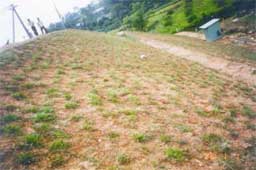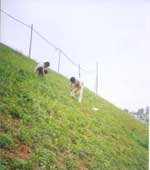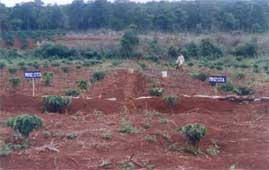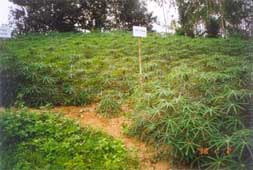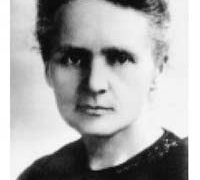In addition to planting protective trees and improving water retention and drainage systems to reduce soil erosion, there is a widely used method around the world today – the use of polymers. For the first time in Vietnam, such a polymer material has been successfully synthesized at the Institute of Chemistry (Vietnam Academy of Science and Technology).
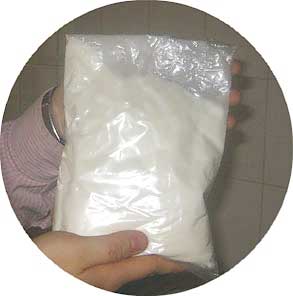 |
|
A bag of PAM packaged in a plastic bag. |
PAM (polyacrylamide) is a fine white powder that can be dissolved in water at a ratio of 10mg/liter and then sprayed onto the soil surface after planting trees or sowing seeds. When dissolved in water, PAM acts as a binding agent, connecting soil particles together. As a result, the surface layer adheres to the underlying soil, reducing the risk of soil erosion and limiting the leaching of nutrients and newly sown seeds…
Not only does PAM bind the soil, it also increases the soil’s water permeability by up to 80%, reducing the flow rate on the soil surface. Its superior water retention capability enhances soil stability, creating favorable conditions for seed germination and root development.
Although it is not a fertilizer, PAM contains about 14-15% nitrogen, which is beneficial for crops and microorganisms. When combined with fertilizers, PAM helps retain more fertilizer during irrigation or rainfall, reducing the amount of chemical runoff into rivers and lowering production costs.
With these beneficial properties, PAM supports tree planting in high-slope areas (hillsides, riverbanks, road embankments…), combating desertification, erosion, and soil degradation. The material remains effective for 12 months after application, provided that the surface is not tilled. PAM can also be mixed into the soil in its dry powder form before planting. 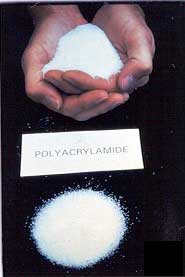
According to Associate Professor Dr. Nguyễn Văn Khôi, head of the research group in the Polymer Materials Department, PAM is an organic compound and its molecules are not absorbed. PAM molecules are stable in the soil, with a retention time of approximately 18 months.
Field trials conducted over one year on sloped land planted with tea and cassava in Thạch Thất, Hà Tây, showed an 80% reduction in erosion and an 11-15% increase in crop yield. The material is also being tested on coffee-growing land in Gia Lai. It is reported that one hectare requires 7-12kg of PAM, priced at 35,000 – 45,000 VND/kg, which is more than half the cost of imported polymers.
Currently, PAM is being produced on a trial scale with a capacity of 70kg per day at the Institute of Chemistry. The main raw material is a product of the petrochemical industry. This product is mixed with a catalyst and then placed in a reactor with tightly controlled parameters regarding residence time, temperature, and feed rate… The final product is PAM.
For now, the research team is finalizing the technology to establish a stable production process, while also expanding the application fields of PAM, especially in transportation.
|
|
|
|
Road embankments planted with grass and sprayed with PAM |
Lush grass on the embankment some time after spraying PAM |
|
|
|
|
Testing PAM on coffee-growing soil in Gia Lai |
Testing PAM on cassava-growing soil |
Minh Sơn








































